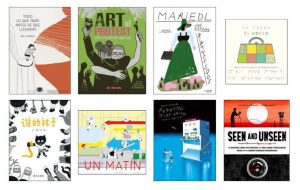The 2023 Bologna Ragazzi Awards attracted 2,349 titles entered by 644 publishers in 59 international book publishing markets.
Following up on coverage earlier this month of the 60th-anniversary Bologna Children’s Book Fair‘s (March 6 to 9) Illustrators Exhibition competition, we have the results of another of this trade show’s major competitions, the Bologna Ragazzi Award program—now in its 56th edition.
This year, the award has had 2,349 titles entered by 644 publishers in 59 countries and territories, with its emphasis not just on illustration but also on graphic-editorial design, innovation, and balance, “along with an ability to create a dialogue with young readers.” This, in other words, instead of an illustration award per se, is something closer to a whole-of-book prize that considers the complex relationship of a successful books many elements.
The trade show, which this year expands its rights-trading floor to include adult literature, is taking care to point out that the Ragazzis can be understood as cues to where newly emerging themes and trends will be found during the 2023 cycle of this industry-facing fair.
There are four repeating top categories to this award-program’s structure, plus one annually changing category:
- Fiction
- Nonfiction
- Opera Prima (for debut authors)
- New Horizons as a category in which jurors believe they see a publishing product with unusual innovation
- Comics (subcategorized to early reader, middle grade, young adult)
- Photography as the 2023 special category
Thematically, the fair’s administration reports that night and nighttime have been recognized this year as topical leads, both in terms of dream-like “unconscious fun and possibilities” and the more predictable concepts of “darker and more painful emotions” from loneliness to shattered friendships, which the fair says “have become a subject for literary exploration.
Seemingly less remarkable than the trend toward the nocturnal, the entries also seem to point to use of the word as a device, as in alphabet books and efforts described as “a need to rename the world,” which sounds ambitious, to say the least.
Something the administration is calling “body truth” seems to have to do with non-traditional expressions of bodily description and conceptualization, with a return of nonfiction for children this season, and discussions around environmentalism beyond educational approaches—a “cosmic belonging” for childhood that’s linked to worldly surroundings.
For further reading: Publishing Perspectives, by Porter Anderson: publishingperspectives.com
